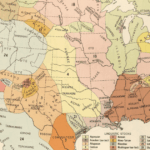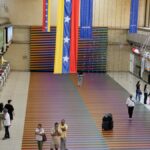
Hundreds of Sudanese children have arrived in the town of Tawila in Sudan’s western Darfur region without their parents since the paramilitary Rapid Support Forces (RSF) seized control of the city of el-Fasher last month, a humanitarian group says.
The Norwegian Refugee Council (NRC) said on Thursday that at least 400 unaccompanied children had arrived in Tawila but that the real number was likely much higher.
- list 1 of 3Sudan’s RSF committing war crimes in Darfur, says Amnesty
- list 2 of 3US calls on Sudan’s warring parties to accept ceasefire plan unaltered
- list 3 of 3Sudanese women in Chad grapple with trauma of wartime violence
end of list
“Children are reaching Tawila exhausted and deeply distressed, often after days of walking through the desert,” the group said.
“Many arrive terrified of the armed groups they fled from or might have encountered on the road. Many became separated from their parents during the chaos of flight, while others’ parents are believed to have gone missing, been detained or killed.”
The RSF seized control of el-Fasher – the capital of Sudan’s North Darfur state – on October 26 after an 18-month siege that cut residents off from food, medicine and other critical supplies.
The paramilitary group, which has been battling the Sudanese Armed Forces (SAF) for control of Sudan since April 2023, has been accused of committing mass killings, kidnappings and widespread acts of sexual violence in its takeover of the city.
The RSF has denied targeting civilians or blocking aid, saying such activities are due to rogue actors.
But United Nations human rights chief Volker Turk said in mid-November that the “atrocities” that have unfolded in el-Fasher “constitute the gravest of crimes”.
More than 100,000 people have fled el-Fasher since the RSF’s takeover last month, according to the latest figures from the UN, with many seeking refuge in nearby Chad.
Advertisement
Meanwhile, the NRC said on Thursday that it had registered at least 15,000 new arrivals in Tawila, about 60km (37 miles) from el-Fasher, since October 26. More than 200 children are being registered each day on average, it added.
Nidaa, a teacher with the humanitarian group’s education programme in Tawila, said children arrive showing “signs of acute trauma”.
“When we first started our classes, some of the children could not speak at all when they arrived. Others were waking up with nightmares,” she said. “They describe hiding for hours, travelling at night to avoid attacks, and becoming separated from family in the chaos.”
Humanitarian groups have said the already heavily populated displacement camps in Tawila are becoming overwhelmed with the influx of new arrivals from el-Fasher and its surrounding villages.
The Sudanese American Physicians Association estimated in early November that more than 650,000 internally displaced people from el-Fasher and other parts of Darfur had sought refuge in Tawila amid months of fighting in the region.
Nearly three-quarters of displaced residents – 74 percent – lived in informal sites without adequate infrastructure, the group said in a November 5 report, while less than 10 percent of displaced households had reliable access to water or latrines.
“These conditions mean Tawila has effectively become a stand-alone crisis epicentre, not merely an overflow from el-Fasher,” the report said.
At the same time, a group of UN experts warned on Thursday that the deteriorating situation in the region has opened Sudanese women and girls up to a heightened risk of sexual exploitation and trafficking.
Displaced children are also increasingly vulnerable to being recruited to fight in the escalating conflict, the experts said.
“We are deeply concerned at the alarming reports of human trafficking since the takeover of el-Fasher and surrounding areas by the [RSF],” they said in a statement.
“Women and girls have been abducted in RSF-controlled areas, and women, unaccompanied and separated children are at elevated risk of sexual violence and sexual exploitation.”
Noting that families have been left without shelter, humanitarian aid, and access to basic services, including healthcare and education, the experts called for “urgent action to end the human rights violations driving this suffering”.
British Caribbean News


